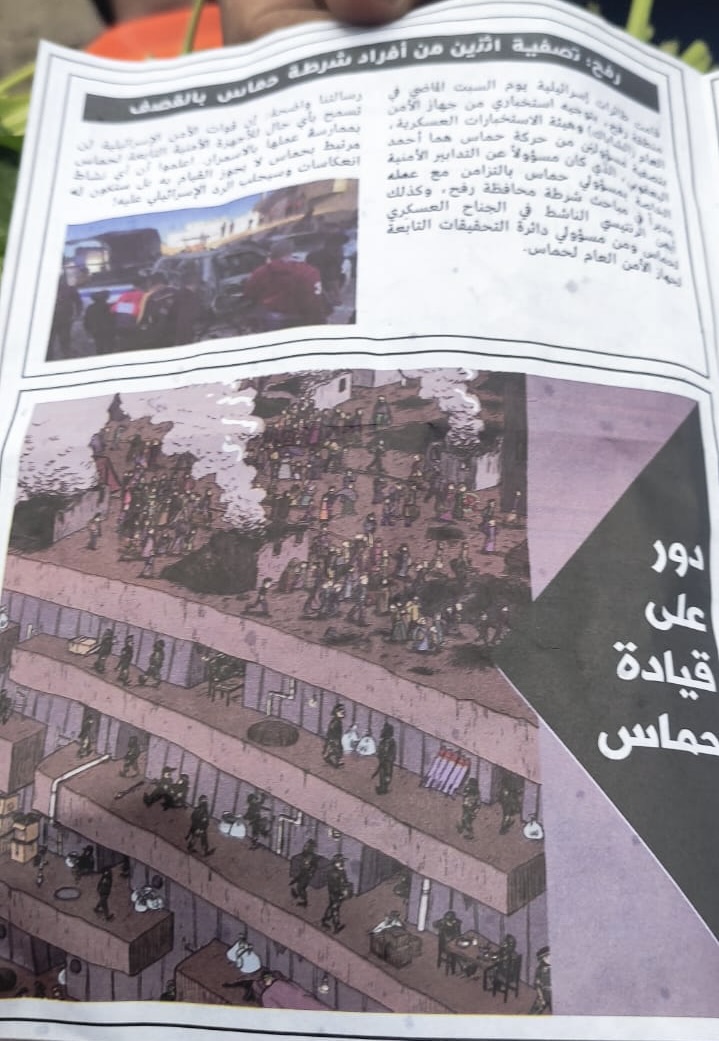GAZA: A publication dropped on Tuesday morning by the Israeli military on Tell es-Sultan district in Rafah, southern Gaza, communicated to locals that Hamas has been “stealing humanitarian aid meant for civilians.”
Titled “The Reality,” the Arabic paper acquired by Arab News’ reporter in Gaza claims to convey “the truth” about the current situation in the embattled Palestinian enclave.

The paper accuses “members of the terrorist Hamas organization” of seizing humanitarian aid meant for civilians, diverting it, and opening fire on whoever gets near the relief warehouses and trucks.

A December report by the Integrated Food Security Phase Classification warned that the entire 2.3 million Gaza population faces crisis levels of hunger, with the risk of famine increasing every day.
While a few aid convoys enter from Egypt to deliver food, water and medicine, the UN stressed that the quantities delivered were a mere 10 percent of what is needed.
The distribution of aid has been hampered by military operations, inspections of aid demanded by Israel, communications blackouts and fuel shortages, according to international media and humanitarian reports.
Israel has repeatedly alleged that Hamas was diverting aid after it entered Gaza, but this claim was denied by UN aid agencies, AP News reported.
On Feb. 17, the Biden administration’s special Middle East envoy for humanitarian issues, David Satterfield, said that Israel did not present “specific evidence” for its claim that Hamas is stealing or diverting UN aid.
The newspaper dropped on Rafah residents on Tuesday showcases how the cost of living in the Gaza Strip “has reached record heights in the last few weeks,” with the prices of every product at least doubling. It used multiple line graphs to detail price hikes in essential goods.
According to the Palestinian Central Bureau of Statistics, food prices increased sharply in November compared to September, with the cost of fresh vegetables rising by 32 percent, mineral water by 74 percent, and potato prices by 30 percent.
The publication, which claims to be the third in a series dropped on Rafah, also instructs Gazans to reach out to the dedicated channels to report any information about the Israelis held hostage by Hamas.
The paper claimed that since the previous edition encouraged locals to “contribute to saving human lives,” the number of reports reaching the dedicated call center rose by eight times compared to the week before.
A paragraph in the section titled “Rescue flood: many reports received at the dedicated center” reads: “Dear readers, we wish to reiterate our message to you: you, too, can contribute to saving the lives of women, children, and elderly from both sides — be it the people of Gaza who are suffering from the cruel war or the hostages kidnapped from their homes by Hamas gangs and should be returned safely and peacefully to their families.”

On Oct. 7, Hamas militants carried out a surprise attack in southern Israel, killing 1,200 people and taking more than 240 others hostage. In retaliation, Israel has launched a relentless bombing campaign in the Gaza Strip, killing at least 29,000 Palestinians in less than five months.
Among several other sections, the newsletter also features a cartoon depicting top Hamas leaders, Ismail Haniyeh and Khaled Meshaal, having a feast while pledging to “fight to the last drop of blood.” It also shows a person on a TV screen holding a banner that says: “Where are the corrupt leaders?”
Since the onset of Israel’s ongoing bombing campaign in Gaza, Israeli authorities have been dropping leaflets on the Strip ordering Palestinian civilians to evacuate areas it was about to bomb.
However, analysis by Western media showed that the Israeli army provided contradictory recommendations on where to seek refuge and that even the routes and areas designated “safe” by the Israeli army were bombed.
Arab News’ reporter in Gaza said that leaflets dropped on Gaza since the onset of the war contained “evacuation orders, threats and fake news.”
He added that in the early days of the war, Gazans used to hastily collect the leaflets to follow the orders, but now, “they collect the leaflets only to use them as containers for selling falafel due to a paper shortage in Gaza.”














